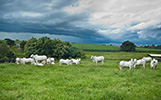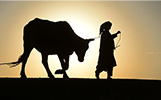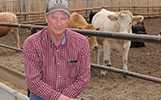| Which is Bigger: Brazil–US Beef Trade Announcement or US Jobs Report? 
Glynn Tonsor, Drovers | August 8, 2016
Last Monday an updated agreement to bilateral beef trade between Brazil and the U.S. was announced. While the U.S. has been accepting beef from Brazil it has largely been confined to cooked or processed product, rather than fresh or frozen, due to past concerns regarding FMD (Foot and Mouth Disease) risks. The updated agreement will extend Brazil's access by allowing fresh or frozen beef to be imported. The flip side of the U.S.–Brazil beef trade announcement is Brazil allowing imports of U.S. beef for the first time since the BSE event of 2003. While any enhancement in ability to export beef is a positive for the U.S. industry, on balance this likely will also have a small impact in the short term.
A report released later last week is arguably more important to the near term cattle market situation. The U.S. jobs report indicates that 255,000 jobs were added in July which is a full 75,000 jobs above pre–report expectations. Coupled with an increase in base wages this is certainly a positive update for meat demand. Increases in employment and wages is beneficial to meat demand given protein is one of the more expensive food items.
Gadvasu to Study Climate Change Resilient Livestock
Times of India | August 11, 2016
Scientists at Guru Angad Dev Veterinary and Animal Sciences University (Gadvasu) have earned a competitive research project, "Towards climate resilient livestock production system in Punjab," from the ministry of environment, forests and climate change, under the National adaptation fund on climate change.
Dr Randhawa said the project aims at developing strategies for sustainability of livestock farming and income for farmers. Major objectives are to ensure sustainable levels of livestock production through scientific interventions, assisted reproductive technologies, environment–friendly housing and measures for timely detection and control of animal and zoonotic diseases.
Veganism Is Not the Key to Sustainable Development – Natural Resources Are Vital 
Jimmy Smith, The Guardian | August 16, 2016
Veganism is not the simple solution to sustainability that George Monbiot recently argued. I wish it were that easy. While I commend those taking steps to change their diets to reduce their environmental footprints, a vegan world – where no one consumes animal–derived meat, milk and eggs – is not how we will achieve sustainable global development.
Sustainable Beef Is Within Our Grasp 
Lee Hart, Canadian Cattlemen | August 15, 2016
Alberta cattleman Bob Lowe didn't have to do any management back flips on his ranch to produce cattle that under a recently completed pilot project qualify as "verifiable sustainable beef."
"To produce cattle that qualify as verifiable sustainable beef didn't require many changes in how we do things on our ranch," says Lowe, who is also chair of the Alberta Beef Producers. "We know what the recommended practices are, we just had to make sure we were following them to the best of our ability and were keeping proper records. It's probably not much different than what many producers do anyway, but it involves making adjustments where needed and keeping records."
Braizl to Overtake US as World's Top Meat Exporter
Kakie Roubaud, Global Meat News | August 17, 2016
Brazil will continue to challenge the US for the position of being the world's biggest meat producer and exporter over the next decade, according to government estimates. The data suggests that Brazilian meat production in 2025/26 will be 30.7% higher than in 2015/6 – amounting to 7.8 million tonnes in additional production – resulting in 33.7mt of output. Chicken meat production is forecast to increase by 34.7% over the next decade, with beef production forecast to rise by 23.3% and pigmeat 35.1% over these years.
In the short term, Brazil's current interim government is trying to boost the poultry sector by authorising the import of additional feed. Brazil's animal protein association (ABPA – Associação Brasileira de Proteína Animal) has reported that its president Francisco Turra and leading companies within this segment have been told by the government that ministers plan to authorise the import of an additional 1m tonnes of corn from the USA by October.
Namibia: Reducing Drought Vulnerability of Livestock Farmers – Part 3
Axel Rothauge, All Africa | August 16, 2016
The National Rangeland Management Policy and Strategy was accepted by Cabinet in 2012 and is being implemented as a voluntary policy with the assistance of the ministry of agriculture.
It advises land users in farming and protected areas on how to utilise their land ecologically sensibly and balance the requirements of livestock and game production with the requirements of a healthy rangeland. | |
